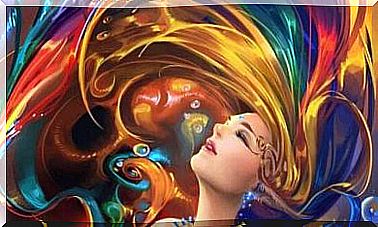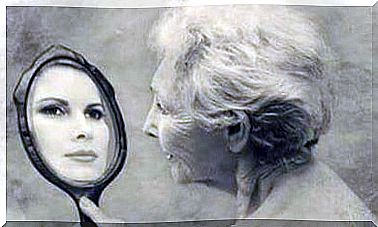The Meaning Of Dreams Throughout History

The analysis of the function and meaning of dreams has changed over the centuries. The theories have evolved, gradually attributing to the dream functions related to learning, survival, rest and mystical beliefs.
In every culture, dream interpretation has been loaded with magical attributes, with direct effects on daily life. With the evolution of culture and technology, the interpretation and study of dreams has also changed.
We have therefore moved from an interpretation that sees in the dream a magical content independent of the dreamer, to analyzes based on scientific theories and focused on brain functioning.
What are dreams?
Dreaming is a universal biological process of the brain. Dreams usually appear during rapid eyes movement (REM) sleep . This sleep phase is defined by the following characteristics:
- Behavioral : partial motor deactivation.
- Physiological : change in brain electrical activity (similar to wakefulness).

REM sleep
In this phase the brain is very active and the motor neurons are blocked by the brainstem, preventing the person from moving. Dreams appear more lucid and with a common thread, although inconsistent.
The eyes move rapidly and brain activity is similar to that of waking. Heart rate and blood pressure also increase.
The meaning of dreams: the first explanations
In Mesopotamian civilizations such as Babylonian or Sumerian, dreams were considered expressions of the divine and enjoyed specific tutelary deities. In Egypt, dreams had the function of omens, messages of destiny that had to be deciphered.
The most famous story is that of the biblical text of genesis. The pharaoh dreamed of 7 lean cows and this was interpreted as a forecast of as many years of drought. On this basis, political and administrative actions were undertaken.
Dreams in Ancient Greece
The Greeks considered dreams as messages from the soul, as revelations. When a person had recurring nightmares, he relied on Morpheus, the god of sleep and dreams.
What is the meaning of dreams and sleep?
Polysomnographic studies allow us to establish that living beings have a biological rhythm of about 24 hours. This process underlies the circadian rhythm, a system based on the hypothalamus.
This natural clock regulates the biological rhythm, influenced by external agents such as light and temperature. It has the job of sending us to sleep or keeping us awake.
Do we dream during the whole time of sleep?
The answer is no. All humans have NREM ( Non Rapid Eyes Movement ) sleep phases , characterized by slow waves, alternating with REM sleep. These phases continue throughout the night.
We each experience about 5 REM sleep intervals, most of which occur in the latter part of the night.
Conservation mechanism
Various authors propose dreams as a conservation mechanism acquired in an evolutionary way from mammals. The elevated brain activity of REM sleep would function as a periodic warning system for possible predator attacks. Thus during the dreams there was an intense activity of the amygdala and the limbic system.
Functions of the dream
- Rest : Allows neurotransmitters to recharge while sensory-motor neurons disinhibit.
- Genetics : dreams have an adaptive characteristic, as they allow us to test behavioral patterns.
- Disclosure : REM sleep has been linked to memory consolidation. In this phase, the weaker connections of the previous day are discarded and the stronger ones are consolidated.
- Creativity : can be seen as a representation of the inner world. Imagination and the brain’s ability to recreate various situations are tested .
- Cognitive Development : The development of visuospatial skills in children was correlated with the quality of dream expressions.
The meaning of dreams and their emotional interpretation
Sigmund Freud was one of the first authors to systematically interpret dreams. He related the meaning of dreams to emotional experiences, in which the unconscious manifests itself through a symbolic language.
So Carl Gustav Jung, already moving away from his master’s theories, proposed under the energetic paradigm a theory in which dreams reveal shared archetypes.
A door to the inner world
It is not difficult to realize that our fears are expressed in our nightmares and our wishes are expressed in our happy dreams. In times of confusion or stress, our true wishes can be expressed in dreams, without the constraints of everyday life.
How to interpret dreams? Starting with psychoanalysis, attempts have been made to classify the meaning of dreams in various ways. This task proved to be very difficult and imprecise due to the cultural variations of the language.
Finding connections between the dream material and everyday life is a way to give them a precise meaning.

Share the meaning of dreams
There are people who find dreams disturbing and prefer not to tell them. Others, however, are intrigued by them and try to analyze them. Here are some tips for those in the second group :
- Annotations. If a dream catches our attention, we need to write it down in the first few minutes after waking up. The more time passes, the less details can be recovered.
- Objectivity. It is necessary to see dreams in an objective way and analyze them for what they are, i.e. internal dialogues of our mind. It has been shown that many times they are directly influenced by external agents. For example, dreaming about ice can have a simple explanation, such as sleeping in a very cold room.
- To consult. Whenever a dream catches our attention or is repeated very often, we can review it with a specialist. He will give us a global and critical view in this regard.
And the nightmares?
They are usually disturbing dreams that reveal times of stress and worry. To prevent the feeling of anguish from pursuing us during the day, we can apply two strategies:
- A distracting task. It has been shown that the more we repeat the dream upon awakening, the more it permeates our memory. To avoid this, we can perform simple tasks such as small math operations in the first few minutes of waking.
- Psychological distancing. It is important to understand that what happened in a dream does not necessarily repeat itself throughout the day. Nightmares are just manifestations of our fears.
Finally, it is important to emphasize that the meaning of dreams will always have a strong subjective component. Therefore, both its physiological and symbolic aspects are open to interpretation.
In any case, it is we ourselves who ultimately have to decide what to do with what we remember from our dreams.









